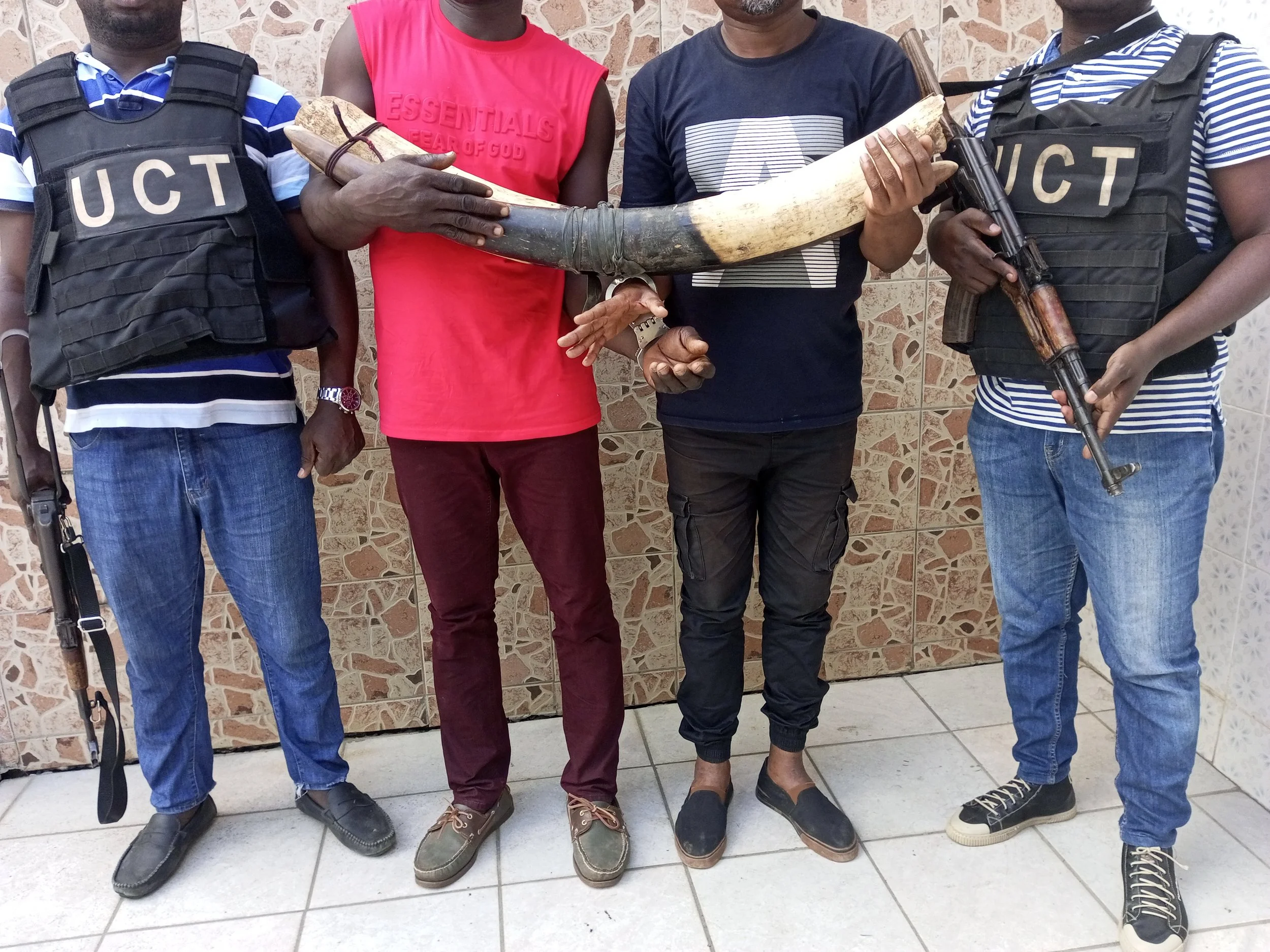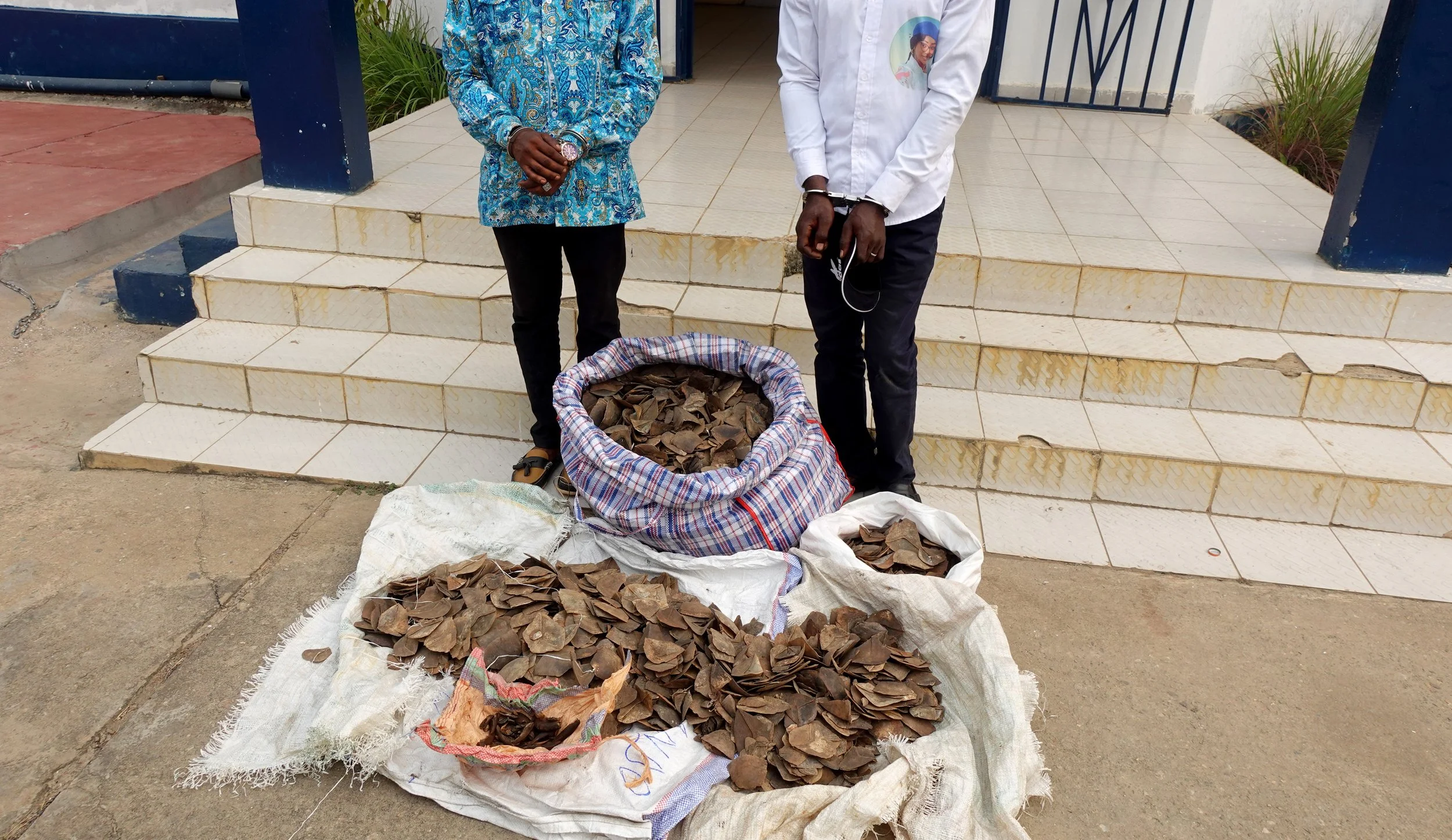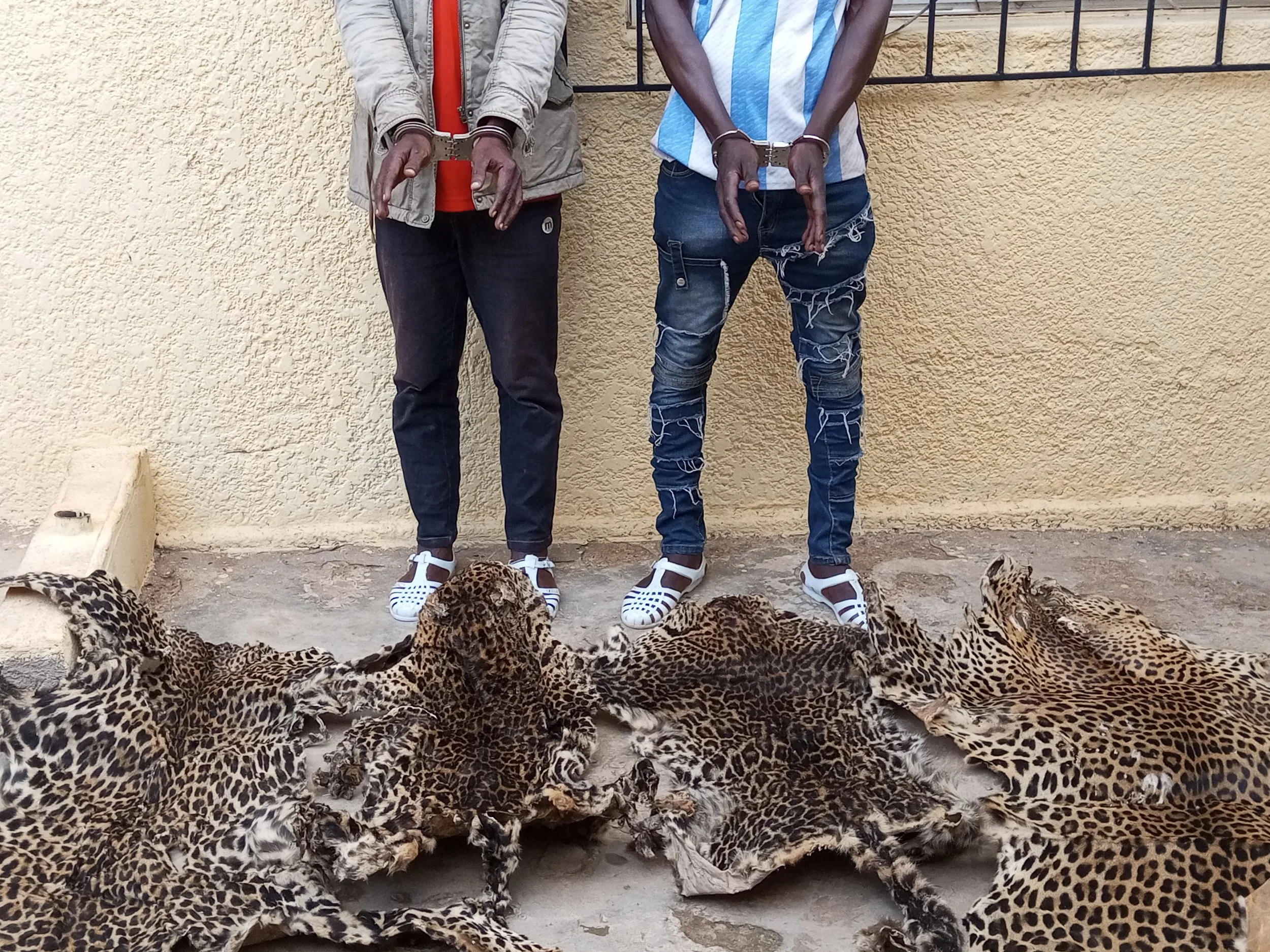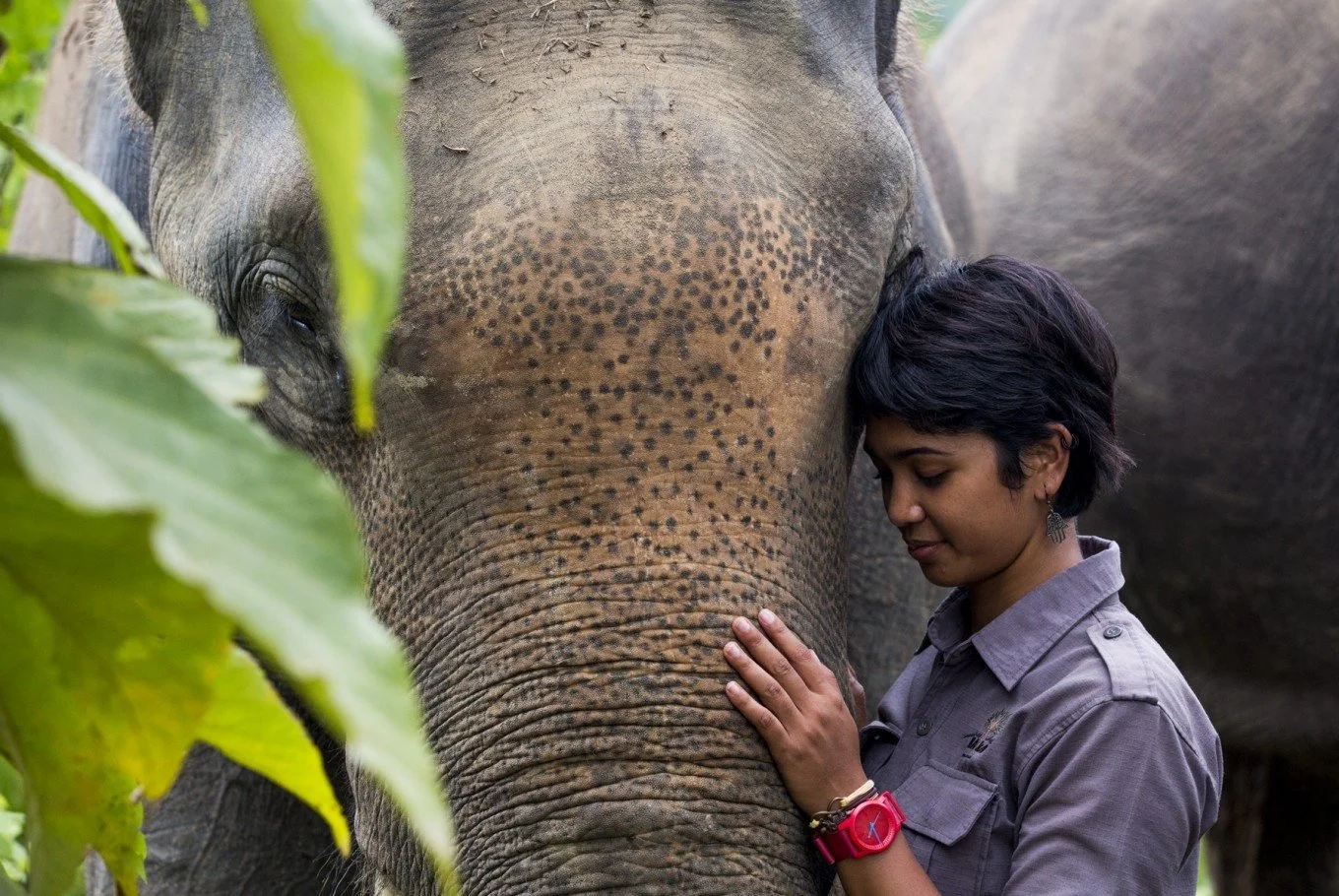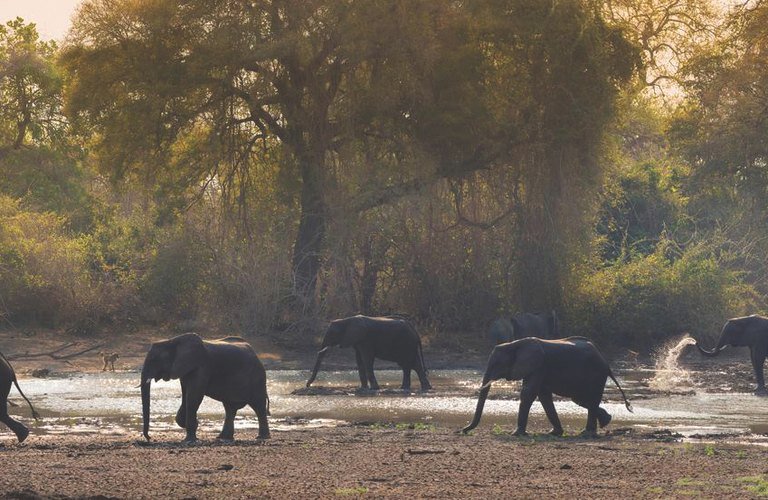The EAGLE Network 2024 Full Report
Summary
✓ Despite several challenges encountered, the EAGLE teams pushed forward, obtaining significant results. 90 wildlife traffickers were arrested in 7 countries.
✓ 66 ivory traffickers were arrested with 474 kg of ivory, which include 67 tusks and 260 ivory pieces.
✓ 13 big cat skin traffickers were arrested during 8 operations in 3 countries with 14 leopard skins seized. A trafficker arrested with 3 lion skins in Uganda
✓ 8 primate traffickers were arrested, 5 in Togo, 2 in Cameroon, and 1 in Cote d’Ivoire. A shipment from Brazil of 12 highly endangered Lear’s macaws and 17 golden lion tamarins on a sailing boat stopped and 5 traffickers were arrested in Togo.
✓ 2 pangolin scale traffickers were arrested in Congo with 81 kg of scales from the endangered giant pangolin.
✓ 81 % of the arrested traffickers remained behind bars at least at the early stages of the prosecution.
✓ 1,548 media pieces were published in national media.
✓ At least in 6 of the operations, corruption was exposed during the arrest or shortly after.
✓ The court handed down several good sentences to wildlife traffickers in Congo.One of them was given a significant punishment of 4 years in prison.
Despite several challenges encountered during the year, the EAGLE teams pushed forward with 90 significant wildlife traffickers arrested in seven countries. It is a positive example of how team spirit and inner motivation play a strong role in getting results and fighting obstacles. A number of significant operations took place, leading to the arrest of some major traffickers. The two new projects of the Network, Uganda and Guinea, became fully functional, and Uganda produced one significant operation against a lion skin trafficker who was arrested with three skins.
Investigators improved their strategies and techniques, stepping up their efforts against international trafficking. Also, online investigations were pushed forward to produce more targets, where investigators could not find them easily.
1,373 investigation missions were carried out to identify wildlife traffickers. At least 8% of the arrested traffickers remained in prison during the early phases of prosecution. During the year, 46 traffickers were prosecuted, and 26 of them were handed prison sentences at various times.
Corruption is prevalent in all levels of the enforcement and judicial process. In five cases of the operations, corruption was witnessed and fought against on the day of arrest or shortly after. When a shipment from Brazil containing 12 endangered Lear’s macaws and 17 golden lion tamarins was stopped and 5 traffickers were arrested in Togo, the main trafficker, who had ties to Israel, Belarus, and Kazakhstan, worked with corrupt police officers to help him escape from jail and leave the country. The well-known ivory trafficker, who had previously been arrested by Customs in Nigeria due to corruption and negotiated his release, was arrested again in Cameroon but later managed to "escape" from police custody. A court clerk was arrested in Congo for using his position to traffic seized ivory from the court’s evidence room. An ape trafficker who was arrested and a baby chimp rescued in Côte d’Ivoire trafficked the chimp from Liberia and talked of the complicity of local wildlife officials.
Traffickers in ivory and other elephant parts represent the vast majority of arrests, while traffickers in pangolin scales are in second place, bird traffickers are third; and traffickers in primates are fourth.
Trafficking in ivory and other elephant parts represents most of the focus during this period, resulting in the largest number of arrested traffickers. 66 traffickers were arrested trafficking in elephant tusks and other body parts. 22 operations were carried out in six countries with 474 kg of ivory, which include 67 tusks and 260 ivory pieces, seized.
In March, four traffickers, including a veteran soldier, were arrested with two elephant tusks weighing 42 kg in Côte d’Ivoire. They used a motorcycle to transport the elephant tusks that were stored in a nearby village. The traffickers intended to use the profit from the deal to fund the killing of elephants in Tai National Park. The operation took place near the Park, which is the largest contiguous rainforest in West Africa. According to several indications, the tusks were from an adult elephant slaughtered in the park, which has an estimated population of 300 elephants. Elephants, the country’s emblem, are on the brink of extinction in the country: their numbers have halved in thirty years.
Four traffickers were arrested with 11 tusks, eight ivory pieces, and seven hippo teeth in a crackdown on a cross-border trafficking ring in June. Two of the traffickers are nationals from Burkina Faso, and they operated alongside two others who were involved in trafficking between the two countries. The gang was involved in organized trafficking for several years, illegally traded mercury from Côte d’Ivoire, and operated a fraud scheme involving old bills.
Five ivory traffickers were arrested with two huge elephant tusks, weighing over 60 kg, in July in Côte d'Ivoire. The traffickers exercised extreme caution, employing various strategies to evade detection until their eventual arrest. Two of the traffickers attempted to escape but were quickly apprehended. The tusks were probably from a forest elephant from Tai National Park. The elephant tusks were dug out from a field where the traffickers had hidden them.
Four traffickers were arrested with four elephant tusks in July. One of them was a forestry engineer working in a logging company and another was an electromechanical engineer in a government ministry. At one time, three of those traffickers were arrested with the tusks concealed in a rice sack. Of course, they attempted to sell the elephant tusks. A quick and effective interrogation soon led to the arrest of the fourth trafficker, who was hiding to avoid being caught with the transaction money.
In August, three traffickers were arrested with two elephant tusks in Cameroon. Among those arrested was a retired Colonel from the Ministry in charge of Wildlife, who has also overseen several National Parks. We have charged and forwarded the Colonel, who abused his position, to court alongside the others. The traffickers concealed the elephant tusks in the boot of a car. They refused to open the boot in an attempt to foil the arrest operation.
Four ivory traffickers were arrested with 3 tusks in October in Congo in a crackdown on judicial corruption. One of them is the head clerk of the high court of Dolisie, who used his position to traffic seized ivory from the court’s evidence room. He was denounced by the other traffickers and a raid was carried out at his home the following morning, when he was arrested. Two of the tusks bear markings corresponding to our operation from 2021. The arrest is an important step in combatting corruption in the judicial system.
An ape trafficker was arrested and a baby chimp rescued in February in Côte d’Ivoire. The trafficker, who is known for his activities, trafficked the chimp from Liberia and talked of the complicity of local wildlife officials. He came by motorcycle with the chimpanzee strapped to his back and managed to cross several roadblocks safely with the chimp visible. The baby chimp exhibits a post-trauma behavior pointing to the extreme abuse inflicted on him.
Eight primate traffickers were arrested: five in Togo, two in Cameroon, and one in Cote d’Ivoire. A shipment from Brazil of 12 highly endangered Lear’s Macaws and 17 Golden Lion Tamarins on a sailing boat stopped and five traffickers were arrested in Togo.
Four major traffickers were arrested in November in Côte d’Ivoire in a crackdown on the notorious Koumassi criminal network. They were connected to two Asian criminal syndicates and supplied them with large quantities of ivory and pangolin scales. One trafficker was first arrested during a deal while possessing more than 200 carved ivory items, and the other traffickers were arrested in their shops with over 30 carved ivory items each. They were implicated in our big case of 2018 dismantling an Asian organized crime for which one of them was arrested and jailed already.
Three ivory traffickers, including two military officers, were arrested with three and a half tusks in a crackdown on corruption and complicity in Cameroon. One of the military officers violently resisted arrest, threatening the arresting force as he struggled. A warrant officer, a sacked army sergeant, and a civilian were arrested together. They all belong to a gang that is involved in trafficking wildlife and other illegal products while posing as military personnel. One of the officers refused to let go of his military bag, raising suspicions as to the content of the bag, further intensifying the struggle to arrest him.
13 big cat skin traffickers were arrested during 8 operations in 3 countries, with 14 leopard skins seized. And a trafficker was arrested with 3 lion skins in Uganda.
Two traffickers, including a Guinean national, were arrested in May in Senegal with a leopard skin, hyena skin, and two serval skins in an action against cross-border trafficking between the two countries. When they arrived at the scene of the transaction and as police closed in on them, they dropped the bag containing the contraband. One of them took to his heels and tried to escape but was chased down by the arresting team, who soon rounded him up.
A trafficker was arrested with two leopard skins in June in Côte d’Ivoire. The skins were concealed in a rice sack. The trafficker is well connected to the Sahel routes, from where most of the skins enter Côte d’Ivoire. ’Ivoire. During interrogations, he admitted the skins were smuggled from Mali.
In June, a trafficker was arrested with three lion skins in Uganda. She seems to specialize in lion parts trafficking. One of the skins was very fresh. This only provides a brief overview of the ongoing lion skin trafficking activities conducted by this group. Lion numbers in Uganda are plummeting; it is estimated that only 200-300 remain in the whole country.
Two traffickers were arrested with four leopard skins, three of which were young, in October. The traffickers were arrested attempting to sell the leopard skins in the town of Soubre, in Western Côte d’Ivoire. The leopards were poached in the Tai National Park. The park is one of the last sanctuaries of tropical forests in the country and a refuge for many endangered species, such as elephants, chimpanzees, and leopards. The traffickers activated several local traffickers around the park.
The shipment from Brazil had highly endangered 12 Lear's macaws and 17 golden lion tamarins on a sailing boat that was stopped, and five traffickers were arrested in February in Togo. Following an arrest and seizure by the Gendarmerie, the EAGLE Togo Team assisted in establishing the illegality of the shipment, including fraudulent CITES permits from Guyana. The team also helped with the care of the fragile animals and connected the two sides of the illegal shipment in constant collaboration with Freeland, which coordinated the Brazilian side with the Brazilian authorities. The Ministry of the Environment and Forest Resources (MERF) and the Brazilian Ambassador to Togo were integral in saving the animals and in reaching a positive outcome. Brazil sent a large government delegation to coordinate the investigation, treat the endangered animals, and bring them back to Brazil.
Two traffickers were arrested with body parts of 2 killed gorillas in April in Cameroon. The parts that included heads and limbs had blood still dripping, indicating the gorillas were recently killed. The two were specialized in poaching and trafficking in great apes. The Legal Team on the ground conducted a jail visit, but the two disappeared immediately due to corruption. They were reported to have “escaped.” The hunt is ongoing, and the corruption incident is under investigation.
Two traffickers were arrested with 81 kg of scales of endangered giant pangolins and 24 nails in the north of the country. One is a priest, while the other is a worker contracted by the city council to lay fiber optic cables around villages—both used their positions to trade in pangolin scales mainly with Chinese nationals. This seizure represents the remains of about 40 individuals of this endangered species, which is racing toward extinction, and serves as only a small glimpse into the ongoing trade conducted by the two traffickers who were arrested. The traffickers hid the scales in a car tire to evade control by wildlife officials while moving them around. They ran a network of several smaller traffickers.
A Chinese national was arrested in a glass eel trafficking crackdown in an exceptional France-Senegal collaboration in Senegal.
A French delegation led by an investigating judge arrived in Senegal in April to investigate the African side of an international trafficking ring in the protected European glass eels. The ring that was first busted in Paris was about to export 300 kg of eels to Senegal. Senegal is a transit country from Europe to Asia. This coincided with a two-year EAGLE investigation into this significant trafficking operation, which uncovered connections to the same French trafficking ring. The EAGLE Senegal Team exposed a vast glass eel criminal operation stretching over several warehouses, locating numerous members of the ring.
In order to maximize the deterrent effect, 1,548 media pieces were published in national media. The distribution of the media pieces across national media was 44% on the internet, 29% on the radio, 24% in print media, and 3 % on TV.



